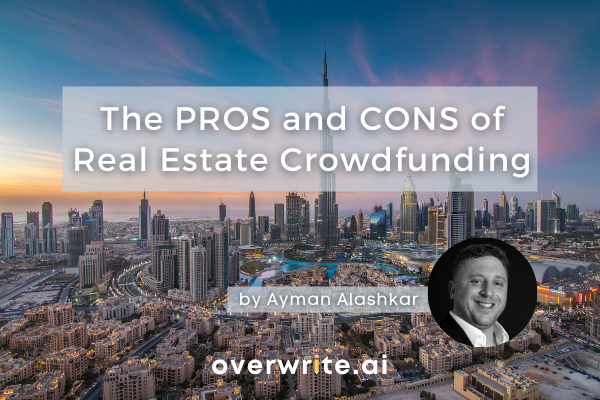
Hark the (re)emergence of the Real Estate Crowdfunding Platform.
Real Estate Crowdfunding isn’t new. The concept’s been around for over a decade. Although now it’s enjoying a re-birth during this age of post-pandemic excess liquidity.
Let’s start at the beginning.
What is Real Estate Crowfunding? It’s the ability for retail investors (Mr or Mrs Smith) to invest nominal sums towards a direct real estate asset acquisition, via a platform that manages the transaction, the financing, and the asset, in exchange for a fee.
In plain English, ‘Invest in property for as little as $500‘.
These soundbites may sound sexy, but they’re often misleading. So together let’s take a closer look at the Pros and Cons of real estate crowdfunding:
The Pros – Why to crowdfund a real estate investment?
Access All Areas
The biggest benefit of real estate crowdfunding is access to dealflow.

Some years back I participated in a crowdfunded acquisition of a commercial property on London’s Oxford Street. The deal proposed that investors would earn an income yield of 2.15% (net of fees) and an IRR of 13% from the value uplift that was explained within the investment pitch. It was a 4-hear hold. I’ll tell you how it went, further down this article.
Point is, the deal was fully subscribed. Investors like me, who’d have never otherwise had the chance to participate in an Oxford Street commercial property acquisition, piled in. Access.
Small Tickets to Big Plays
Real estate is traditionally a very lumpy asset class. It takes a large amount of capital to buy a property, and ties up that money for the duration of your holding period.
Crowdfunding real estate can be done with small tickets. Enabling investors to participate in big real estate investment plays, without needing to have, or indeed lock-up, large sums of equity for long periods of time.
Liquidity – Getting your money out.
Direct real estate ownership is when you directly own a property in your name. Like your house.
Crowdfunding real estate is not direct asset ownership. It’s indirect. You will own shares in companies that are set up to buy and own the properties directly. Those shares can be sold to the other shareholders of the company, or to third party investors, via the crowdfunding platform’s internal marketplace, without the need to sell the property. Making your ability to get your money out, easier. More liquid.
Diversification
Crowdfunding investors can distribute their capital across an array of property types and sectors. That’s investment theory 101. Spread risk out strategically, across a diversified range of properties. Instead of putting equity into a residential rental investment.
Invest across a basket of residential, commercial, and retail properties. Each with their own economic and tactical opportunities.

The Cons – Why not to real estate crowdfund?
Fees
Where direct real estate investment puts you in the driver’s seat. Indirect crowdfunded investment leaves you, the retail investor, reliant on the platform you’re investing through, to manage your investment and the property. They’re putting this deal together from beginning to end. And they’re going to charge a fee.

Whether they charge a stack of them; like a sourcing fee, an admin fee, an early-exit fee, or a carry… Or they roll their remuneration into a single, seemingly innocuous ‘Administrative’ fee. The platform you’re investing through is clipping a slice of your investment for themselves, before you see a penny.
Illiquidity
Promoting crowdfunded real estate platforms on the basis of their liquidity sounds nice in theory. You’ll be told you can sell your shares in the company that owns the property, fast. And get your money out with little administrative hassle. But read the fine print.
- There might be a minimum lock-in period during which you can’t exit your capital.
- It’s not uncommon for a crowdfunding platform to demand the right of first refusal to buy your shares. Not a bad thing, but it won’t pay full value for them.
- Often the platform will give themselves the authority to approve (or reject) any buyer for your shares that you might find on the secondary market.
Any one of these conditions, creates illiquidity. So read up on your chosen platform’s T&C’s. Know your rights.
The Unspoken Upside
Here’s the dirty little secret that crowdfunding platforms don’t want you to hear.
Before it can offer a property to its crowd of investors, a platform needs to source and secure it.
To do that, the platform either buys the property outright and flips it to the crowd. Or locks in the right to buy it at a price, then secures the crowd funding for it, at a higher price.
In both cases there’s a markup. A delta, between the price the platform secures the property for, and the price it pitches it to its crowd at.
That difference is an upfront upside, that the platform keeps for itself. It’s an immediate profit that’s coming out of your investment’s bottom line. An ethical crowdfunding platform should declare the property’s true acquisition price, source a deal for its crowd at no profit, and justifiably charge a sourcing fee for its troubles.
Beware of any platform that does not declare the true purchase price of its properties to its crowd. Especially if they’re also charging a sourcing fee. Big red flag. 🟥
The Waterfall
Remember that deal on London’s Oxford Street that I invested in years back? The one that promised a 13% IRR? Guess what ended up happening with it.
The distribution of returns didn’t play out as the platform had proposed in their pitch.
The pitch was based on a rental income uplift to be gained, from a lease renewal that was due during the investment holding period. That renewal ran into trouble. Negotiations between the property manager and tenant dragged out. Lawyers got involved. Legal fees skyrocketed. The platform didn’t distribute dividends as they’d promised. After 4 years, what was supposed to have been an IRR of 13% ended up closer to 7%.
This despite all the ‘professional’ opinions (from lawyers, property professionals etc..) that the pitch had cited at the start.
The sting in the tail is that when you’re a retail investor, sh*t falls down. It’s not the platform that’s at the bottom of the totem pole. It’s you.
The platform’s banked its upfront upside. It’s been paid all its administrative fees. All it’s got to lose is its carry fee. That’s the fee they get if things go as well as, or even better than planned. Think of it like a performance bonus.

The platform’s banked its upfront upside. It’s been paid all its administrative fees. All it’s got to lose is its carry fee. That’s the fee they get if things go as well as, or even better than planned. Think of it like a performance bonus.
But let’s face it. Things don’t always go to plan. And when it hits the fan, the only one losing…is you. Because here’s the thing about being an indirect, retail investor. You’re too small to matter. In the cascading waterfall of profit distribution, you’re last in the queue.
Let’s Wrap This Up
So, is real estate crowdfunding a good investment?
If you want to diversify your portfolio. Get in on property deals you otherwise can’t access. Put smalls sums of capital to work. Then sure. Give it a go.
BUT…read up. Know who you’re investing through and the conditions of your investment. Be aware that the platform you’re investing through is carrying little or no risk on the trade. And that they will make more profit from your money, than you will.
overwrite.ai | the AI writing assistant for estate agents | Sign up for your Free 7 Day Trial.
For informative and light-hearted news and views on the world of real estate, follow overwrite.ai on Instagram and LinkedIn, and keep up-to-date with our weekly NewsBites blog.